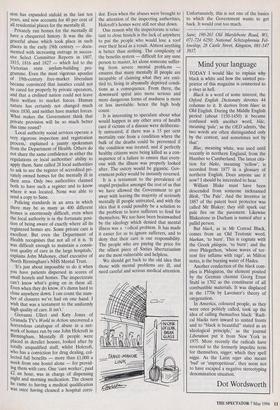Mind your language
TODAY I would like to explain why black is white and how the sainted pro- prietor of this magazine is connected to a river in hell.
Black is a word of some interest; the Oxford English Dictionary devotes 44 columns to it. It derives from blaec in Old English. During the Middle English period (about 1150-1450) it became confused with another word, blew, meaning 'pale'; as the OED admits, 'the two words are often distinguished only by the context, and sometimes not by that'.
Blac, meaning white, was used until recently in northern England, from the Humber to Cumberland. The latest cita- tion for blake, meaning 'yellow', is recorded from 1877 in a glossary of northern English. Does anyone use it now? I should be interested to hear.
William Blake must have been descended from someone nicknamed Bleik, 'The Pale'. And the inventor in 1887 of the patent boot protector was called Mr Blakey; they still spark out pale fire on the pavement. Likewise Blakestone in Durham is named after a pallid person.
But black, as in Mr Conrad Black, comes from an Old Teutonic word, blaekan, 'to burn'. This is cognate with the Greek phlegein, `to burn'; and the river Phlegethon, 'whose waves of tor- rent fire inflame with rage', as Milton notes, is the burning water of Hades.
Another connection of the black com- plex is Phlogiston, the element posited by the German chemist Georg Ernst Stahl in 1702 as the constituent of all combustible materials. It was displaced in the 1770s by Lavoisier's theory of oxygenation.
In America, coloured people, as they were once politely called, took up the idea of calling themselves black: 'Radi- cal blacks turn inward to united fronts and to "black is beautiful" stated as an ideological principle,' as the journal Liberation put it from New York in 1975. More recently the radicals have reverted to the formerly impolite term for themselves, nixer, which they spell nigga. As the Latin niger also meant `bad' or `unpropritious', they seem not to have escaped a negative stereotyping denomination situation.
Dot Wordsworth


















































 Previous page
Previous page